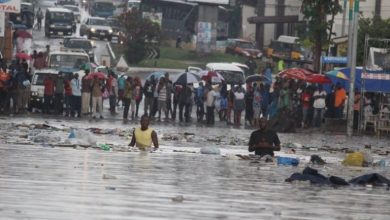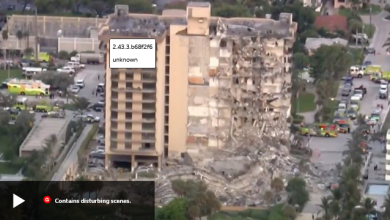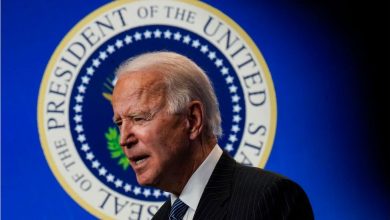International
Hong Kong extradition: Debate over bill delayed amid protests

Thousands of protesters and police in Hong Kong are engaged in a stand-off as anger grows over a bill which would allow extradition to mainland China.
Early on Wednesday protesters, some wearing face masks and helmets, blocked key roads around government buildings.
Police in riot gear responded by using pepper spray on protesters to disperse them and said they were prepared to use force.
The Legislative Council (LegCo) has now delayed the second reading of the bill.
The pro-Beijing LegCo said Wednesday’s scheduled meeting would instead be held at an unspecified “later time”.
Despite the opposition the government is continuing to push for the extradition bill and it is expected to pass its final vote on 20 June.
What’s happening today?
Thousands of protesters – mostly young people and students – took to the streets and attempted to block access to government buildings ahead of the scheduled debate of the bill.
“This behaviour has gone beyond the scope of peaceful gatherings,” the Hong Kong Police Force said in a tweet on Wednesday.
“We call on [protesters] to leave as soon as possible… otherwise we will use appropriate force.
Matthew Cheung, Hong Kong’s administration chief, has urged protesters to stop occupying major roads and disperse as soon as possible, the Sing Tao Daily reports.
But one young protester, decked in a black mask and gloves, told news site AFP that they would not “leave [until] they scrap the law”.
Political party the Hong Kong National Front has threatened to enter the Legislative Council and remain “indefinitely” on strike if the government does not withdraw the bill.
Critics of the bill of amendments to the extradition laws cite the alleged use of torture, arbitrary detentions and forced confessions in the Chinese judicial system.
The government has promised legally binding human rights safeguards and other measures it says should alleviate concerns.
Nevertheless, this has led to the largest rallies the territory has seen since it was handed back to China by the British in 1997.
Police said they are also investigating death threats made against Hong Kong’s Chief Executive, Carrie Lam, and members of the justice department over the bill.
An all too familiar fight
By Martin Yip, BBC News Chinese, Hong Kong
The roar of the crowds gathered in Hong Kong brings back memories of day one of the Umbrella Movement in 2014. The images are familiar too.
There are young people wearing surgical masks dragging iron barriers placed by the police in order to build their own barricade. The roundabout outside the Legislative Council Complex is filled with protesters.
Somebody threw a water bottle at police in riot gear guarding the entrance to the parliament and then they all stood up, waving their batons, shouting: “Who did that?”
Five years ago on the first night of the Occupy protest a similar scene erupted into chaos as police deployed tear gas canisters.
There have been no real clashes so far and protesters greeted the news that the debate had been postponed with jubilation. The council speaker gave no reason, but pro-democracy legislators told the crowd, that pro-Beijing colleagues just couldn’t get in.
Postponing the meeting might defuse the situation for now, but nobody knows for how long – because the crowd is refusing to go.
Who is involved?
A wide range of groups have spoken out against extradition to China in recent days including schools, lawyers and businesses, with hundreds of petitions also in circulation.
More than 100 businesses including a magazine have said they will shut to allow their staff to protest for freedom and nearly 4,000 teachers said they would strike.
A number of financial companies, including HSBC, have made flexible work arrangements for Wednesday.
Powerful business lobbies say they fear the plans will damage Hong Kong’s competitiveness as a base of operations.
On Sunday, organisers say, more than a million people took to the streets holding placards and demanding the government abandon the amendments, though police estimated turnout was 240,000 at its peak.
What are the proposed changes?
They allow for extradition requests from authorities in mainland China, Taiwan and Macau for suspects accused of criminal wrongdoing such as murder and rape. The requests will then be decided on a case-by-case basis.
The move came after a 19-year-old Hong Kong man allegedly murdered his 20-year-old pregnant girlfriend while they were holidaying in Taiwan together in February last year.
The man fled to Hong Kong and could not be extradited to Taiwan because they do not have an extradition treaty.
Hong Kong officials have said courts in the territory will have the final say over whether to grant extradition requests, and suspects accused of political and religious crimes will not be extradited.
The government has sought to reassure the public with some concessions, including promising to only hand over fugitives for offences carrying a maximum sentence of at least seven years.
Hong Kong has entered into extradition agreements with 20 countries, including the UK and the US.
What is Hong Kong’s relationship with China?
Hong Kong was a British colony from 1841 until sovereignty was returned to China in 1997.
Central to the handover was the agreement of the Basic Law, a mini-constitution that gives Hong Kong broad autonomy and sets out certain rights.
Under the “one country, two systems” principle, Hong Kong has kept its judicial independence, its own legislature, its economic system and the Hong Kong dollar.
Its residents were also granted protection of certain human rights and freedoms, including freedom of speech and assembly.
Beijing retains control of foreign and defence affairs, and visas or permits are required for travel between Hong Kong and the mainland.
However, the Basic Law expires in 2047 and what happens to Hong Kong’s autonomy after that is unclear.
Chinese foreign ministry spokesman Geng Shuang said on Monday that Beijing would “continue to firmly support” Hong Kong’s government, adding: “We firmly oppose any outside interference in the legislative affairs” of the region.
Source: BBC



